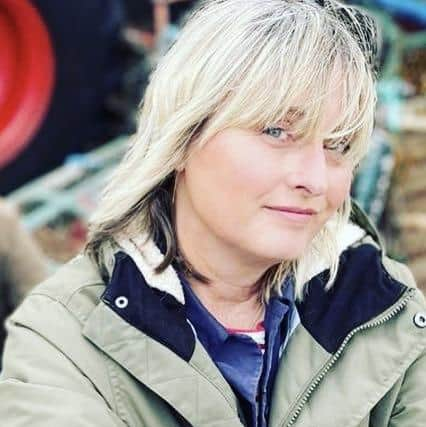Wuthering Bytes: Hebden Bridge technology festival returns with Dr Sally Rodgers from Ibiza music legends A Man Called Adam
It is this kind of perspective she will put forward at the technology festival Wuthering Bytes, which is returning to Hebden Bridge in West Yorkshire later this month 10 years on from its inaugural event.
The showcase started in 2013 when Andrew Back and Tim Harbour got together in a pub and came up with the idea of putting on a festival about interesting and inspiring tech in the small market town.
Advertisement
Hide AdAdvertisement
Hide AdTaking place for the first time since 2019, the week-long event will start with Festival Day on Friday, August 25.


The festival will bring together engineers and creators of different kinds to take part in a series of talks, workshops and live demonstrations designed to feed their curiosity in technology.
Dr Sally Rodgers, a renowned DJ and academic, will take to the stage for a keynote speech to close Festival Day. In her presentation, The Poetry of Everything, she will talk about her life in music - she is one half of electronic duo A Man Called Adam - research and beliefs about technology.
Sally, who is from Teesside and lives near Saltburn after a previous stint in Keighley, says that in Hebden Bridge, you can “feel the free-thinking in the air as you walk around - it flows through town.”
Advertisement
Hide AdAdvertisement
Hide AdAt these kinds of conferences, audiences will always learn something, she says, because participants are asking idiosyncratic questions which they devote so much time and effort to.
“Everybody who does a PhD or studies something hard or becomes a specialist in something, they have their own very unique questions and they go deeper into that question than most people do. So you're always going to discover something really interesting.
“I don't know much about 3D printing, but I know that that person who talks about that has really gone down the rabbit hole in an extreme way with that subject, whatever they're talking about, and so you're always going to learn something fascinating and new.
“I thought, also, this (event) just feels a bit less dry, a little bit more fun.”
Advertisement
Hide AdAdvertisement
Hide AdSally moved to London at 17 and her duo A Man Called Adam, with Steve Jones, brought out music with Gilles Peterson’s Acid Jazz Records in the late 1980s. After acid house music’s rise, the duo were closely associated with Ibiza in the 90s.
Later, they decided to pursue academia, with Sally studying poetry, and later a PhD, at St Andrews. Until recently, she was a tutor of seven years at Leeds Conservatoire.
Speaking about her keynote speech, she says: “The main theme is about communication. Because of my study of poetic form, and technology and my engagement with technology, I'm quite passionate about the idea that all our communications are in a way - even when we share a meme or we edit a little video or something – these are significant poetic forms.
“It's a technological intervention that creates a form just like a villanelle or a sonnet, or whatever, these are new poetic forms.”
Advertisement
Hide AdAdvertisement
Hide AdElsewhere, artificial intelligence (AI) is an area which has caused concern recently, with fears it will take away jobs and could hinder human creativity.
Sally, though, sees it differently and thinks we should work with AI. New technology can be used in ways that were not intended and bring about exciting new forms of culture, she believes.
“Take acid house, for example. Roland invented a bass machine, and everybody took it and used it in a completely different way than you're supposed to use it.”
It enabled a new musical form that “takes the world for a little while,” she says.
Advertisement
Hide AdAdvertisement
Hide Ad“AI is obviously a more complex beast, but I feel that it's a technology that we should allow to disrupt our lives. It's another disruptive technology.
“We've invented it. We were clever enough to invent it. It's there now, let it help us create a better society and do those jobs that people don't want to do.
“Let's get the universal income up and running so we've got time to look after our elders and our natural world, and people can live wired to more conscious lives, because of the artificial consciousness that we've created to do some of the stuff.”
She acknowledges this is “a little bit utopian,” but adds that “we have big problems to solve and maybe it can help us”.
Advertisement
Hide AdAdvertisement
Hide AdOther speakers will be appearing at Wuthering Bytes across the week.
Bill Thompson, an esteemed technology journalist and prominent advisor to arts and cultural organisations, will be giving the opening keynote at the festival.
Matthew Venn, a science and technology communicator and electronic engineer, will be delivering a talk on how to design your own open source microchips.
Composer, electronic artist and robotic instrument maker Sarah Angliss will be exploring the life and legacy of British composer and electronic musician Daphne Oram, electronic sound culture and the problems of preserving early digital art.
Advertisement
Hide AdAdvertisement
Hide AdEd Rogers of Bristol Braille Technology – who create better Braille technology and break down the barriers blind people encounter – will deliver a talk on their full-page refreshable Braille Linux workstation.
Dr Laura James, a specialist in engineering new technologies to help people and society, will return to this year’s Festival Day as compère.
Andrew Back, Wuthering Bytes co-founder, says: "After the disruptions of Covid-19, it’s fantastic that Wuthering Bytes is returning and bringing together people who are passionate about technology.”
Festival Day tickets are now available and cost £10. For more information and tickets, visit wutheringbytes.com